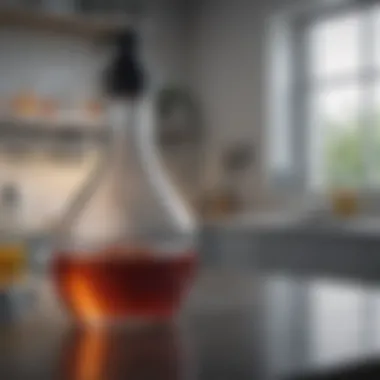Unlocking the Potency of Vinegar for Disinfection and Antibacterial Action


Inspiring Homes
Stunning Locations
In the realm of household cleaning, vinegar's efficacy as a disinfectant provides a natural and sustainable solution for maintaining a clean and hygienic environment. Whether in urban apartments or countryside estates, the versatility of vinegar in killing bacteria makes it a valuable asset for homeowners seeking eco-friendly cleaning practices. Understanding its antibacterial properties and the optimal methods for utilization can enhance the effectiveness of vinegar as a cleaning agent across diverse living spaces.
Interior Design Trends
Integrating vinegar as a disinfectant into interior design strategies not only fosters a clean and healthy living environment but also aligns with contemporary trends in sustainable living. As homeowners increasingly prioritize eco-conscious practices, the incorporation of vinegar into cleaning routines complements the ethos of environmentally-friendly design. By exploring innovative ways to incorporate vinegar into home cleaning regimens, individuals can seamlessly merge functionality and style while fostering a healthy living space.
Travel Guides
For avid travelers and exploration enthusiasts, understanding the efficacy of vinegar as a disinfectant is paramount when venturing into new territories. Whether staying in hotels, rental accommodations, or vacation homes, having vinegar on hand can offer a familiar and effective means of disinfection. Through comprehensive travel guides that highlight the practical applications of vinegar in maintaining cleanliness during travels, travelers can optimize their cleaning routines and prioritize health while exploring diverse destinations.
Real Estate Market Insights
In the realm of real estate and property management, the utilization of vinegar as a disinfectant holds implications for property maintenance and presentation. By incorporating vinegar into cleaning protocols for properties on the market, real estate professionals can showcase homes in their best light, highlighting a commitment to cleanliness and maintenance. Understanding the effectiveness of vinegar as a disinfectant in the context of real estate market insights can offer valuable perspectives for property owners, investors, and industry professionals.
Introduction
Vinegar's efficacy as a disinfectant and antibacterial agent is a topic of significant importance in maintaining cleanliness and hygiene. Understanding the properties and applications of vinegar can provide valuable insights into its role in various settings. This article delves into the diverse aspects of vinegar's effectiveness, shedding light on its composition, properties, and limitations.
Understanding Vinegar
Vinegar, a versatile household staple, derives its effectiveness from its composition and properties. The Composition of Vinegar, primarily consisting of acetic acid, plays a pivotal role in its disinfectant and antibacterial capabilities. This key characteristic enhances vinegar's ability to combat germs and bacteria effectively, making it a popular choice for natural cleaning solutions. Despite its pungent odor, the Composition of Vinegar's natural origins and eco-friendly attributes outweigh any minor disadvantages.
Types of Vinegar vary based on their sources, with popular options like apple cider vinegar and white vinegar. Each type offers unique benefits, such as apple cider vinegar's potential health advantages and white vinegar's strong disinfectant properties. Understanding the distinctions between Types of Vinegar allows for informed decision-making when selecting the most suitable option for specific cleaning tasks.
Properties of Vinegar
The high Acetic Acid Content in vinegar is a primary driver of its cleaning capabilities. Acetic acid's acidic nature contributes to vinegar's antibacterial properties, making it an effective agent for killing germs on surfaces. This key characteristic grants vinegar an edge in disinfection, particularly in comparison to synthetic cleaning agents. While the Acetic Acid Content confers vinegar its disinfectant power, it is essential to exercise caution due to its corrosive potential when concentrated.
Vinegar's p H Level is another vital aspect influencing its cleaning prowess. The acidic pH of vinegar serves as a natural preservative and disinfectant, ensuring its effectiveness in combating bacteria. This attribute, coupled with its non-toxic nature, positions vinegar as a safe yet powerful alternative to harsh chemical cleaners. However, its acidic pH may pose limitations on certain surfaces, necessitating careful consideration during usage.
Disinfectant vs. Antibacterial


Distinguishing between vinegar's role as a disinfectant and an antibacterial agent is crucial for understanding its scope of action. The Differences Explained lie in vinegar's ability to kill germs (disinfectant) and inhibit bacterial growth (antibacterial). This dual functionality grants vinegar a comprehensive approach to cleanliness, addressing both immediate disinfection needs and long-term bacterial control. By comprehending the Differences Explained, users can leverage vinegar effectively for varied cleaning requirements.
Is Vinegar Effective as a Disinfectant?
Vinegar's efficacy as a disinfectant is a topic of significant interest and importance in this comprehensive exploration. Understanding whether vinegar can effectively combat harmful bacteria and serve as a reliable disinfectant is crucial in evaluating its suitability for various applications. By examining the specific elements of vinegar's disinfectant properties, we can shed light on its benefits and considerations within the context of disinfection and antibacterial use.
Efficacy Against Bacteria
Common Bacteria Targeted
In the realm of disinfection, the ability of vinegar to target common bacteria is a crucial aspect worth discussing. Identifying the specific types of bacteria that vinegar can effectively combat provides valuable insights into its overall effectiveness as a disinfectant. By highlighting the key characteristics of these targeted bacteria and explaining why they are relevant in this discourse, we can appreciate the choice of vinegar as a primary disinfection agent. Furthermore, understanding the unique features of these bacteria in relation to vinegar's efficacy allows us to assess both the advantages and potential drawbacks of utilizing vinegar in antibacterial applications.
Effectiveness in Killing Bacteria
Another significant aspect to consider is vinegar's effectiveness in killing bacteria. Evaluating how well vinegar performs in eradicating harmful pathogens sheds light on its utility as a disinfectant agent. By emphasizing the pivotal characteristics that contribute to vinegar's success in disinfection, we can discern why it is a preferred or commonly employed option in such scenarios. Additionally, delving into the distinctive features of vinegar's bacterial-killing prowess enables us to gauge its overall efficiency and effectiveness in combating bacterial contamination.
Application Methods
Surface Disinfection
When it comes to disinfection applications, surface disinfection stands out as a critical aspect of vinegar's utility. Exploring how vinegar can effectively disinfect various surfaces provides invaluable insights into its practical applications. By spotlighting the key characteristics that make vinegar a preferred choice for surface disinfection, we can grasp the reasons behind its popularity in such settings. Describing the unique features of vinegar in surface disinfection helps us understand both its advantages and potential limitations in disinfecting different types of surfaces.
Food Contact Surfaces
The disinfection of food contact surfaces is a specialized application of vinegar that warrants attention. Examining how vinegar can safely and effectively disinfect surfaces that come into contact with food is essential in ensuring food safety. By emphasizing the key characteristics that make vinegar suitable for use on food contact surfaces, we can appreciate its importance in maintaining hygiene standards. Detailing the unique features of vinegar in this context allows us to evaluate its advantages and challenges in disinfecting surfaces exposed to food contaminants.
Limitations and Considerations
Effectiveness on Tough Stains
One of the limitations worth considering is vinegar's effectiveness on tough stains. Assessing how well vinegar can tackle stubborn stains provides insights into its versatility as a disinfectant agent. By highlighting the key characteristic of vinegar's performance on tough stains, we can understand why it may excel in some scenarios while facing challenges in others. Describing the unique feature of vinegar in addressing tough stains enables us to weigh its advantages and disadvantages in handling hard-to-clean surfaces.
Compatibility with Other Cleaners
An important consideration is the compatibility of vinegar with other cleaners. Understanding how vinegar interacts with different cleaning agents is crucial in optimizing its disinfectant capabilities. By highlighting the key characteristic of vinegar's compatibility with other cleaners, we can discern why it is a preferred or alternative option in various cleaning routines. Exploring the unique feature of vinegar in combination with other cleaning products allows us to evaluate its advantages and potential drawbacks when used alongside alternative disinfectants.


Vinegar as an Antibacterial Agent
In this section, we will delve deep into the pivotal role of vinegar as an antibacterial agent within the context of its efficacy as a disinfectant and antibacterial solution. Vinegar, a versatile household item, showcases remarkable properties that extend beyond just cleaning surfaces. Its significance as an antibacterial agent lies in its ability to inhibit bacterial growth and prevent bacterial proliferation in various environments. Understanding these elements sheds light on the multifaceted nature of vinegar's effectiveness in maintaining hygiene and minimizing the spread of harmful bacteria.
Antibacterial Properties
Inhibiting Bacterial Growth:
The ability of vinegar to inhibit bacterial growth serves as a cornerstone in its role as an antibacterial agent. By impeding the proliferation of bacteria on different surfaces, vinegar acts as a proactive solution to maintaining a clean and sanitary environment. Its unique characteristic of thwarting bacterial growth highlights its suitability for disinfection purposes. The advantage of this property is evident in its natural composition, offering a safe and eco-friendly alternative to chemical-laden antibacterial products. While vinegar's inhibiting abilities are commendable, some may find its scent off-putting, presenting a minor drawback despite its numerous advantages.
Preventive Applications:
When considering preventive applications, vinegar emerges as a reliable choice for maintaining bacterial control. Its preventive traits are rooted in its ability to deter bacterial colonization on surfaces and objects frequently exposed to contamination. This proactive approach aligns with the broader goal of curbing potentially harmful bacterial outbreaks. The distinctive feature of vinegar's preventive action lies in its non-toxic nature, making it a preferred option for households seeking a natural antibacterial solution. While the benefits of using vinegar preventively are substantial, its effectiveness may vary based on the type and concentration used, necessitating thorough consideration in real-world applications.
Comparison with Chemical Antibacterials
In exploring vinegar's efficacy as an antibacterial agent, it is pertinent to juxtapose its performance against chemical antibacterial counterparts. Evaluating effectiveness levels reveals that while vinegar may not match the rapid killing power of some chemical agents, its consistent use can yield comparable results over time. The key characteristic of vinegar in this comparison is its sustainable antibacterial action, offering a long-term approach to combating bacterial threats. One unique feature of vinegar is its natural composition, which appeals to eco-conscious consumers seeking greener alternatives. Despite its efficacy, some users may find vinegar's antibacterial performance slightly slower than chemical alternatives, necessitating patience for optimal results.
Safety Considerations
When discussing vinegar as an antibacterial agent, an essential aspect is considering its safety features in comparison to chemical antibacterials. Safety considerations encompass factors such as skin irritation risks, allergic reactions, and ingestion concerns. The key characteristic of vinegar's safety profile is its mild nature, posing fewer risks compared to harsh chemical compounds. This appealing feature makes vinegar a preferred choice for individuals with sensitivities to conventional antibacterial products. However, as with any substance, precautions must be taken to avoid potential risks associated with ingestion or prolonged skin contact. While vinegar offers a safer antibacterial alternative, users must remain vigilant and follow best practices to prevent adverse effects.
Safety and Precautions
In the realm of utilizing vinegar as a disinfectant and antibacterial agent, understanding safety and precautions is paramount. It is imperative to grasp the essentiality of adhering to safety measures when dealing with such potent substances. A meticulous approach to safety ensures effective utilization while safeguarding against potential hazards. By embracing a proactive stance on safety protocols, users can harness the full potential of vinegar's disinfecting properties with confidence and precision.
Skin Contact
Potential Irritation
When addressing potential irritation concerning vinegar usage, one must acknowledge its significance in the broader context of safety and precautions. The key characteristic of potential irritation lies in its role as an indicator of vinegar's potency in disinfection. This potential irritation serves as a beneficial signal, highlighting the active nature of vinegar in combating bacteria effectively. While potential irritation signifies the robust nature of vinegar as a disinfectant, users must handle it carefully to prevent any adverse skin reactions that may arise.
Allergic Reactions
Discussing allergic reactions in the context of vinegar's antibacterial properties sheds light on an essential aspect of safety considerations. The key characteristic of allergic reactions underlines the need for cautious utilization of vinegar, particularly for individuals with heightened sensitivities. Understanding the unique feature of allergic reactions emphasizes the necessity of conducting patch tests and observing skin responses before widespread application. Despite its advantages in natural antibacterial efficacy, allergic reactions underscore the importance of prudence in handling vinegar-based products.


Ingestion Risks
Poisoning Concerns
Delving into the realm of poisoning concerns associated with vinegar usage elucidates a critical element of safety considerations. The key characteristic of poisoning concerns underscores the potential risks posed by ingesting concentrated vinegar solutions. Vigilance in storage and proper labeling can mitigate the likelihood of accidental ingestion, safeguarding against poisoning incidents. While vinegar is a potent disinfectant, its ingestion risks necessitate strict adherence to safety guidelines to prevent any untoward incidents.
Usage in Food Preparation
Exploring the usage of vinegar in food preparation unveils a crucial aspect of ingestion risks and safety practices. The key characteristic of utilizing vinegar in food preparation underscores its dual functionality as a culinary enhancer and disinfectant agent. While incorporating vinegar in food recipes adds flavor and antimicrobial properties, ensuring judicious usage is vital to avoid ingestion mishaps. Understanding the unique feature of vinegar in food preparation emphasizes the need for careful handling to prevent inadvertent ingestion and promote safe culinary practices.
Ventilation and Toxicity
Proper Usage Environments
Addressing proper usage environments concerning vinegar's disinfectant properties elucidates the importance of ventilation and toxicity management. The key characteristic of proper usage environments underscores the necessity of well-ventilated spaces when working with vinegar-based products. Ensuring adequate airflow minimizes exposure risks and promotes a safe disinfecting environment. While vinegar's toxicity in concentrated forms demands caution, creating optimal usage environments mitigates potential health hazards and optimizes disinfection outcomes.
Indoor Air Quality
Discussing indoor air quality in the context of vinegar's disinfectant applications sheds light on a pivotal aspect of safety considerations. The key characteristic of indoor air quality highlights the impact of vinegar fumes on respiratory health and indoor environments. Maintaining good indoor air quality through proper ventilation minimizes the risks associated with inhaling vinegar vapors while disinfecting spaces. Understanding the unique feature of indoor air quality underscores the importance of creating a healthy and safe atmosphere when leveraging vinegar for antibacterial purposes.
Future Research and Applications
When delving into the realm of Future Research and Applications concerning vinegar's effectiveness as a disinfectant and antibacterial agent, it becomes apparent that there are numerous avenues worth exploring. Understanding the nuances of how vinegar interacts with different surfaces and bacteria strains offers a promising frontier for scientific inquiry. Researchers are keen on investigating the ideal concentration of acetic acid in vinegar for optimum disinfection efficacy. Moreover, exploring new application methods that enhance vinegar's antibacterial properties could revolutionize the way we approach cleaning and sanitization. The implications of future research in this field are profound, potentially leading to the development of novel vinegar-based products that cater to specific disinfection needs.
Scientific Studies
Ongoing Research Projects
A crucial aspect within the realm of ongoing research projects is the investigation into incorporating essential oils with vinegar to boost its antimicrobial properties. This unique approach aims to leverage the synergistic effects of both natural compounds, potentially yielding a more potent disinfectant solution. The use of essential oils such as tea tree oil or eucalyptus oil alongside vinegar showcases promising results in laboratory settings. However, challenges persist in scaling up this formulation for practical applications due to stability and compatibility issues. Despite these challenges, ongoing research in this domain highlights the fusion of vinegar with essential oils as a promising strategy to enhance its antimicrobial efficacy.
Emerging Trends
Emerging trends in vinegar research lean towards exploring its role in combating antibiotic-resistant bacteria. With the rise of antibiotic resistance posing a significant global health threat, researchers are investigating the potential of vinegar as a natural alternative to traditional antibiotics. The antimicrobial properties of vinegar show promise in inhibiting the growth of multidrug-resistant bacteria, offering a sustainable and eco-friendly solution to this pressing issue. Furthermore, the research focus on utilizing vinegar as a food-safe antibacterial agent opens up exciting possibilities for enhancing food safety standards and reducing reliance on chemical disinfectants. These emerging trends underscore vinegar's versatility as a potent antimicrobial agent with far-reaching implications.
Commercial and Industrial Uses
Potential Expansion
The potential for expanding vinegar's applications in commercial and industrial settings is vast, presenting lucrative opportunities for businesses in various sectors. From incorporating vinegar-based cleaning solutions in hospitality industries for eco-conscious cleaning practices to utilizing vinegar formulations in medical settings for sterilization purposes, the scope for growth is extensive. The inherent biodegradability and low toxicity of vinegar make it an attractive choice for organizations looking to adopt sustainable cleaning practices. Moreover, the versatility of vinegar in different concentrations and formulations allows for tailored solutions to meet specific disinfection requirements, further enhancing its market appeal.
Regulatory Challenges
While the potential benefits of integrating vinegar into commercial and industrial settings are evident, regulatory challenges loom large on the horizon. Ensuring compliance with existing safety and quality standards poses a significant hurdle for companies seeking to introduce vinegar-based products into the market. Regulatory bodies require comprehensive efficacy and safety data to support the claims of vinegar's disinfectant and antibacterial properties, adding complexity to the approval processes. Addressing these regulatory challenges demands rigorous testing, documentation, and adherence to stringent guidelines to obtain the necessary certifications for commercial and industrial use. Navigating the regulatory landscape is essential for businesses aiming to leverage the benefits of vinegar as a disinfectant and antibacterial agent in various commercial applications.



